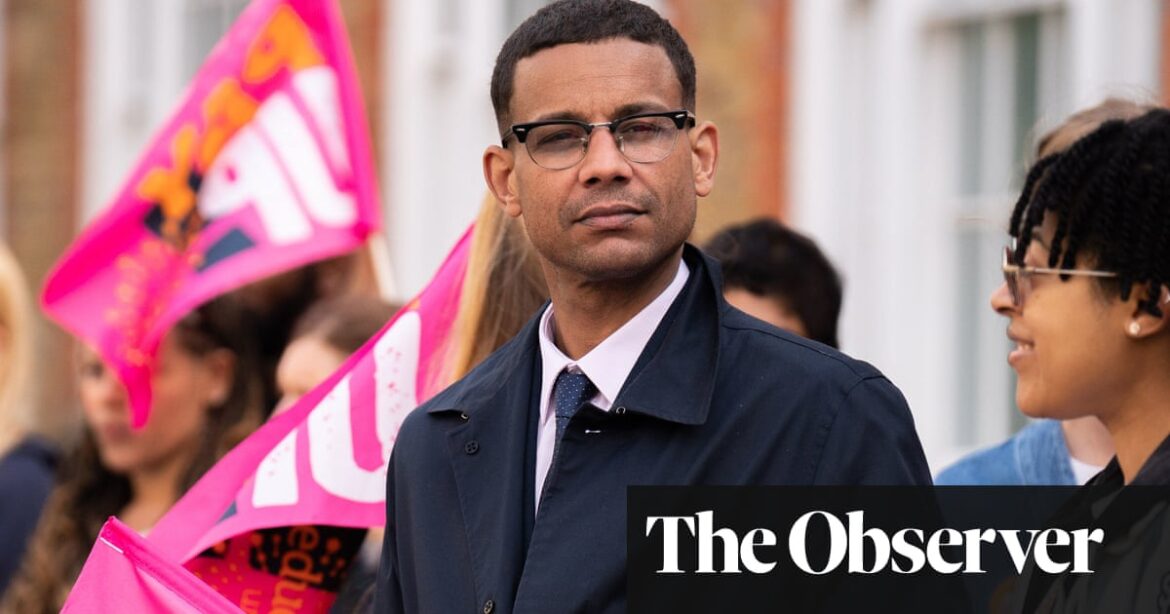
Headteachers have warned that stemming the “disastrous” flood of teachers leaving the profession should be as much of a priority for Labour as its plan to recruit thousands of new ones.
New government data has revealed that for the first time last year nearly as many teachers left the profession in England as entered it. According to the school workforce census, 44,002 teachers joined in the year to November 2023, but 43,522 teachers left.
Daniel Kebede, general secretary of the National Education Union, said the “disastrous” figures were a “shocking indictment of this government’s record”.
As one of its six election commitments, Labour has promised to recruit 6,500 more teachers, funded by increasing taxes on private schools. Kebede said that while teachers welcomed this commitment, it equated to just one new teacher for every four schools, meaning the sector would still be tens of thousands of teachers short of what it needed.
He called on Labour to establish an independent commission on the recruitment and retention of teachers if it won the election, saying: “When we have the largest class sizes in Europe and we are losing this many teachers we urgently need a new direction of travel.”
Schools have been reporting a severe shortage of maths and science teachers for many years – with job adverts commonly receiving no suitable applicants – but the crisis has now extended to previously buoyant subjects including English. Schools say subject specialists are leaving for less stressful or better-paid sectors and not being replaced.
Will Teece, headteacher of Brookvale Groby Learning Campus, a secondary academy in Leicester, said: “The crisis is already here. The government has buried its head in the sand for so long that I worry it’s almost too late to resolve it.”
His school has re-advertised some teaching posts four or five times and still not found anyone to interview.
Urging Labour to focus on how to keep teachers as well as hire them, Teece said they frequently left schools because they had so much work that their home lives were suffering. “They are looking after other people’s children and not spending any time with their own.”
Jonny Uttley, chief executive of the Education Alliance, which runs 11 schools in Hull and East Yorkshire, said: “Year after year the crisis in hiring and keeping teachers has been getting worse.”
He said Labour could make some changes without big funding commitments. “Simply having a government that wants to talk up the teaching profession, after so many years of ministers talking it down, would make a huge difference to morale,” he said.
Research has consistently shown that the biggest issue driving teachers to leave is workload. Uttley argued that one of the best and cheapest ways of tackling this would be to change the accountability regime, under which schools are constantly afraid of high stakes Ofsted inspections, and are pitted against each other in the government’s Progress 8 performance measures.
after newsletter promotion
The government has stuck by Ofsted’s use of single-word judgments, despite many months of vehement campaigning following the suicide of headteacher Ruth Perry. But Labour has said it will ditch them and introduce report cards instead.
Uttley said: “Ofsted is a ridiculous game and drives so much stress. If you remove single-word judgments it can become a professional dialogue with schools about how to improve.”
In April ministers were accused of making the teaching recruitment crisis even worse by axing funding to a successful and much-praised programme helping older workers start a new career in the classroom. Now Teach, the charity that runs the Department for Education’s £1.7m career change programme, which has over-delivered on its recruitment targets, told the Observer this weekend that it was “hopeful” that Labour would resurrect it.
Lucy Kellaway, the journalist-turned-teacher who runs the scheme, said: “We aren’t turning people away. That would be appalling given the teacher shortages.”
Describing the decision to cut the scheme when it was working as “absolutely mad”, she said Labour had made “positive noises”. The charity has been fundraising privately to ensure that it does not have to turn away the many good candidates who it says are “pushing at our door”.
Source: theguardian.com



